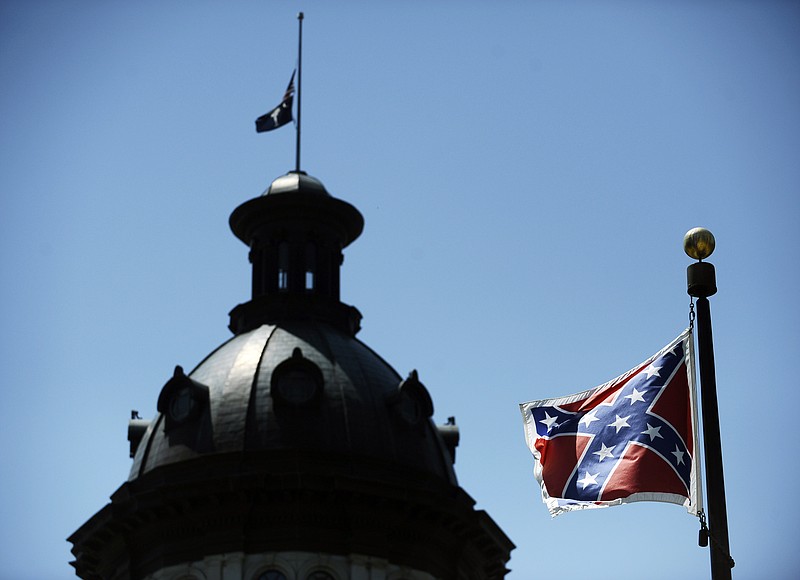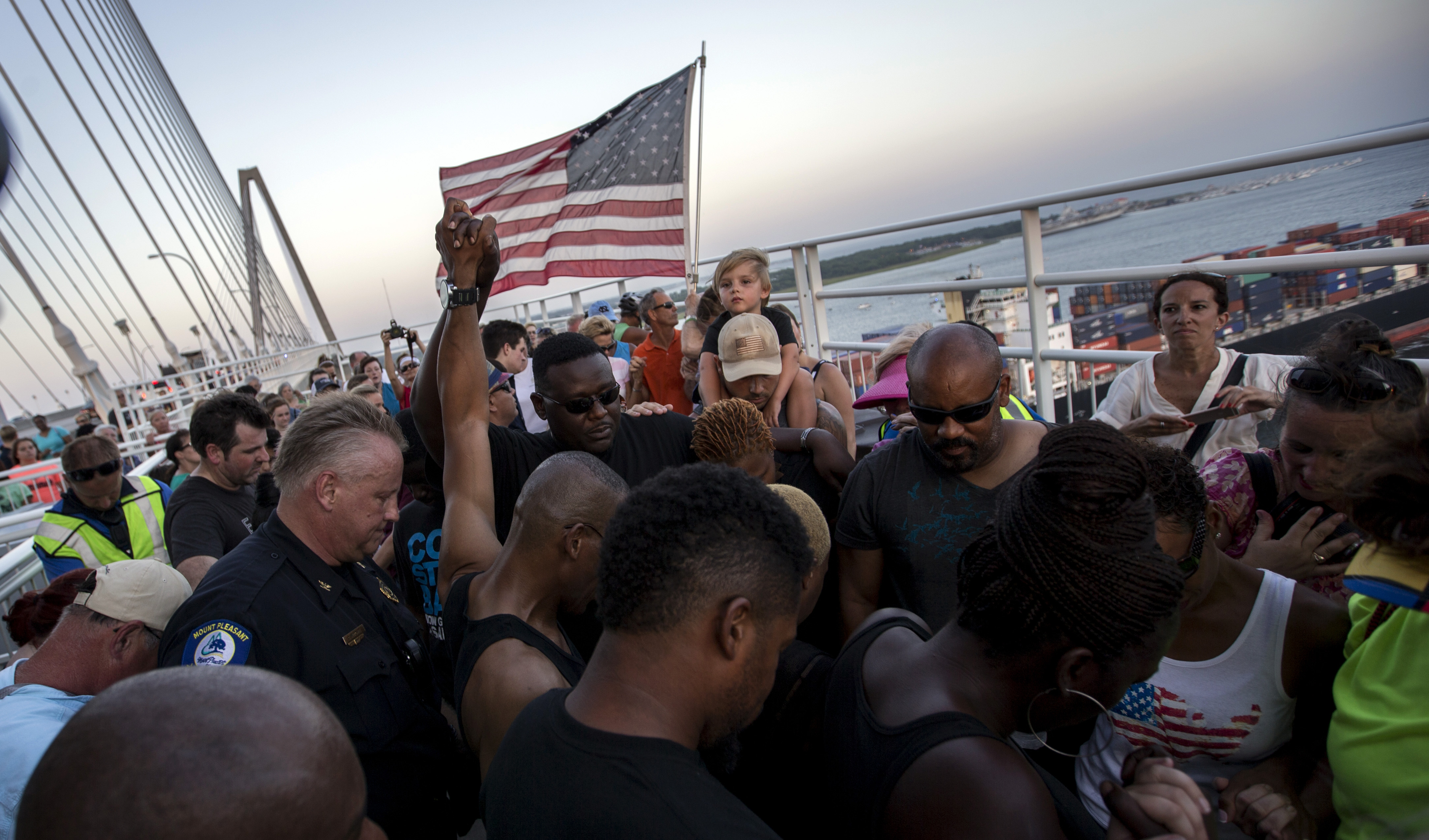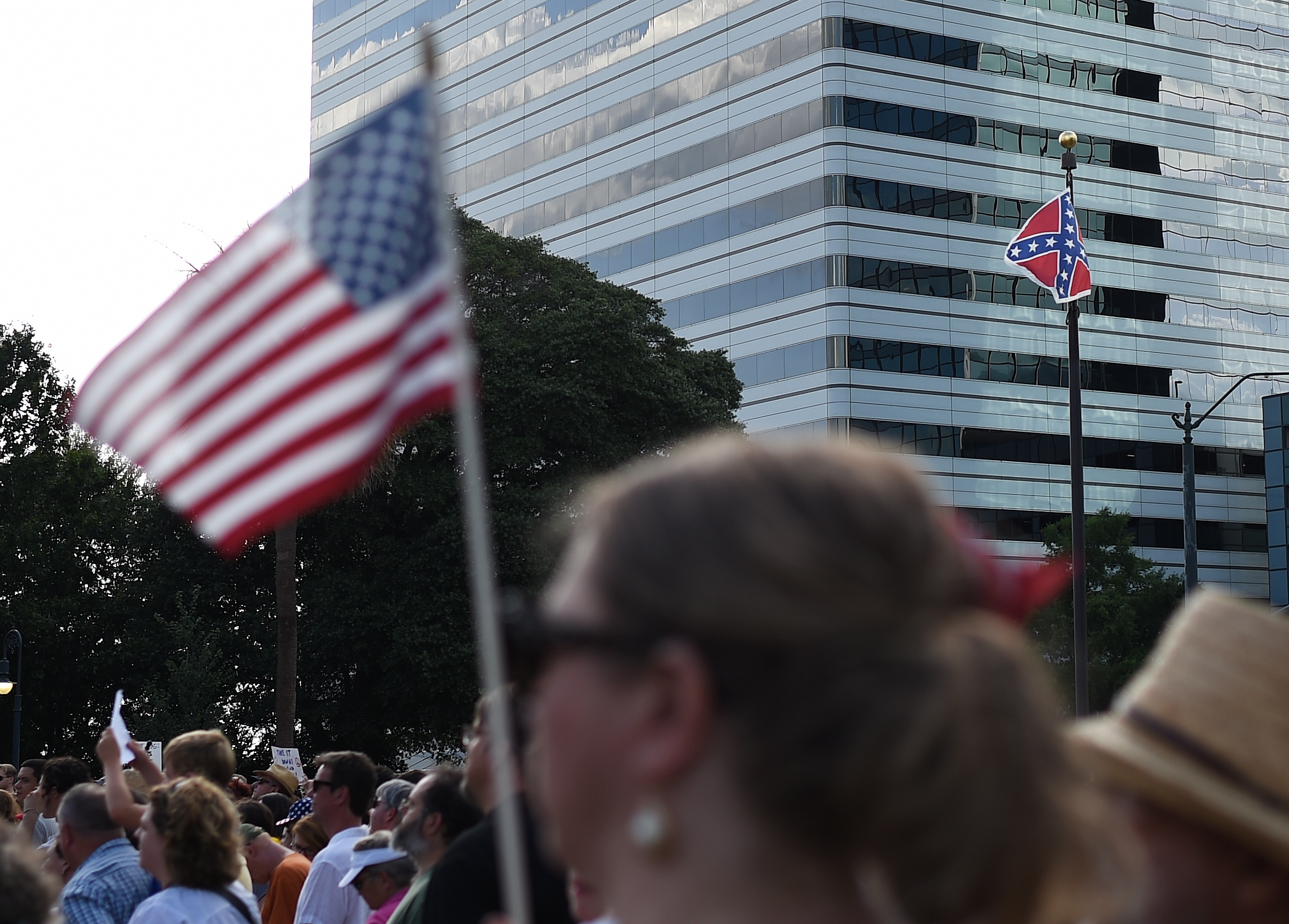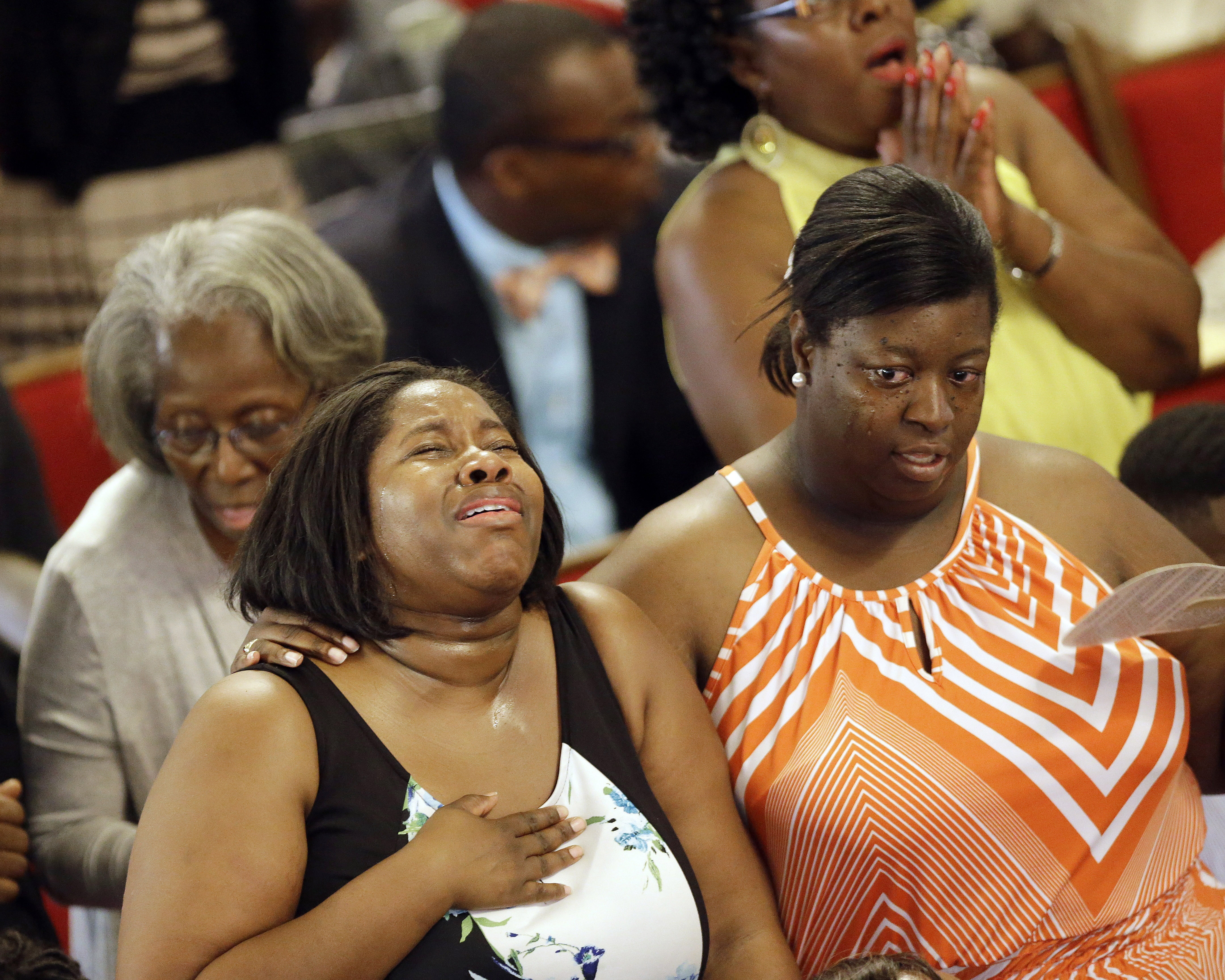CHARLESTON, S.C. - South Carolina's governor declared Monday that the Confederate flag should be removed from the grounds of the Statehouse, reflecting what she described as a new consensus that the slayings of nine black churchgoers have changed what the banner stands for.
Read more
Cook: What Emanuel AME Church can teach us
Gov. Nikki Haley's about-face comes just days after authorities charged Dylann Storm Roof, 21, with murder. The young white man appeared in photos holding Confederate flags and burning or desecrating U.S. flags, and purportedly wrote of fomenting racial violence. Survivors told police he hurled racial insults during the attack.
"The murderer now locked up in Charleston said he hoped his actions would start a race war. We have an opportunity to show that not only was he wrong, but that just the opposite is happening," she said, flanked by Democrats and Republicans, blacks and whites who joined her call.
"My hope is that by removing a symbol that divides us, we can move our state forward in harmony, and we can honor the nine blessed souls who are now in Heaven," Haley said.
Only days after the massacre inside the Emanuel African Methodist Episcopal Church, what was long thought politically impossible in South Carolina became the go-to position for the state's politicians.
Haley, a Republican, urged the state's GOP-led House and Senate to debate the issue no later than this summer. If not, she said she will call a special session and force them to resolve it. "I will use that authority for the purpose of the legislature removing the flag from the statehouse grounds," she said.
Making any changes to the banner requires a two-thirds supermajority in both houses under the terms of a 15-year-old deal that moved it from atop the Statehouse to a position next to a monument to Confederate soldiers out front.
Tennessee's two U.S. senators weighed in on the debate Monday, starting with Sen. Bob Corker's comments during an appearance on MSNBC's "Morning Joe" show. The South Carolina-born Corker said he saw no reason for the flag's continued usage.
"It's a state issue, and I acknowledge that it's a state issue, but I'm saying that if I were there, I would certainly vote to have it come down," Corker said. "It serves no purpose anymore, especially after what has occurred."
Sen. Lamar Alexander also issued a statement Wednesday that was in step with Corker's comments.
"It is up to the people of South Carolina, but I hope they remove a flag that many see as a symbol of racial intolerance," he said. "The flag to fly is the American flag because it is a symbol that this is one country and we are all Americans."
***
In Chattanooga, reactions to the flag flap ranged from impassioned to passive.
Ann Law said she couldn't believe the issue was still up for debate in 2015.
"Are you kidding me?" she said. "It should be burned."
Marcus Ellsworth equated the flag to other hate-filled emblems.
"In all honesty, it belongs next to the Nazi flag and other SS symbols," he said. "Either you're for the liberation of all people or you're not."
Ellsworth said he found it strange that more people, regardless of race, didn't find it offensive that the flag atop the Confederate War Memorial enjoyed certain protections that prevented it from being lowered.
"How does the flag of treason have more protections than the flag we all fight for and live under?"
Greg Anzalone, a white man who was born in south Mississippi and raised in Atlanta, said he thinks the Confederate flag should have been removed as a southern state symbol a long time ago.
"I always felt the South was wrong with the practice of slavery," he said. "I realize the war was about states' rights, but when they lost the war, they lost the right to fly the Confederate flag. They were defeated. To continue to fly it is to continue old southern attitudes."
Anzalone said he learned about the symbolic weight a flag has when his family was driving through Selma, Ala., on a trip. He said he saw the American flag being flown above the post office upside down, which is a sign of distress.
"It made me realize what a powerful symbol a flag really is," he said.
Others didn't feel as strongly about the issue.
Natchez Udoh, a black man who recently moved to Chattanooga from California, said the flag didn't carry the same meaning for him than it might to those born and raised in the South.
"I don't know how to interpret it," he said. "Living here in Tennessee, I can see that this is some people's culture, descendents of people who wanted to separate into a different country, so when I look at it, I don't interpret it as a representation of people that want to kill a particular race."
***
Efforts to remove the Confederate battle flag have proven to be career suicide for other South Carolina politicians. The Sons of Confederate Veterans have already warned that they will fight to keep it.
Haley acknowledged that there are very different views about what it symbolizes.
"For many people in our state, the flag stands for traditions that are noble," she said. "The hate-filled murderer who massacred our brothers and sisters in Charleston has a sick and twisted view of the flag. In no way does he reflect the people in our state who respect, and in many ways, revere it."
For many others, "the flag is a deeply offensive symbol of a brutally oppressive past," she said.
South Carolina can survive and thrive "while still being home to both of those viewpoints. We do not need to declare a winner and a loser," she said. "This is a moment in which we can say that the flag, while an integral part of our past, does not represent the future of our great state."
Only a few months have passed since Haley, an Indian-American, described an opponent's rally to bring down the flag as a campaign stunt.
She claimed that businesses weren't bothered by the flag's presence on the Statehouse grounds, despite continuing calls by black groups to boycott the state, and said "we really fixed all that" with her election as the state's first female and first minority governor, and the election of Republican Tim Scott as the first black U.S. senator since Reconstruction in the South.
The day after the shooting, Haley's posture had changed.
"We woke up today and the heart and soul of South Carolina was broken," she said.
The Confederate battle flag was first placed atop the Statehouse in the 1960s as an official protest of the civil rights movement. It was moved from the dome to a flagpole on a corner of the grounds in 2000, as part of a compromise between a group of black lawmakers and the Republicans who have controlled South Carolina for a quarter-century.
That deal has kept it flying high since the shooting, even as state and U.S. flags were lowered to honor the victims. It also means that when thousands of mourners honor Emanuel's slain senior pastor, state Sen. Clementa Pinckney, they will likely see the Confederate flag before or after filing past his coffin in the Statehouse.
Haley was flanked by Scott and U.S. Sen. Lindsey Graham, now running for president, as well as South Carolina's only other black congressman, Democratic Rep. Jim Clyburn. The chairman of the Republican National Committee has also called for the flag's removal.
"Last week's terrorizing act of violence shook the very core of every South Carolinian," State House Speaker Jay Lucas said earlier Monday. "Moving South Carolina forward from this terrible tragedy requires a swift resolution of this issue."
The White House said President Barack Obama respects the state of South Carolina's authority to decide the issue, but believes the flag belongs in a museum. Obama knew Pinckney personally, and plans to deliver his eulogy in Charleston on Friday.
"The flag got appropriated by hate groups. We can't put it in a public place where it can give any oxygen to hate-filled people," said Charleston Mayor Joseph P. Riley Jr., a Democrat.
The last governor to take this political risk, Republican David Beasley, was hounded out of office in 1998 by the Sons of Confederate Veterans, and the group's influence also doomed his front-running Senate campaign for the seat won by Republican Jim DeMint.
"Do not associate the cowardly actions of a racist to our Confederate Banner," the group's South Carolina commander, Leland Summers, said in a statement. "There is absolutely no link between The Charleston Massacre and The Confederate Memorial Banner. Don't try to create one."
It remains to be seen whether two-thirds of both houses will vote against such sentiments.
Sen. Darrell Jackson, D-Columbia, helped broker the compromise in 2000, and raised these concerns Monday before the governor declared her intentions.
"It is my opinion - as someone who's fallen on that sword before and shed blood and had the scars to prove it and the threats to prove it - I think the House should do it first. That's the largest body. If the House is serious, send us a two-thirds 'sine die' amendment, and I think the Senate will do the right thing," Jackson said.
Staff writer Will Healey contributed to this story.



